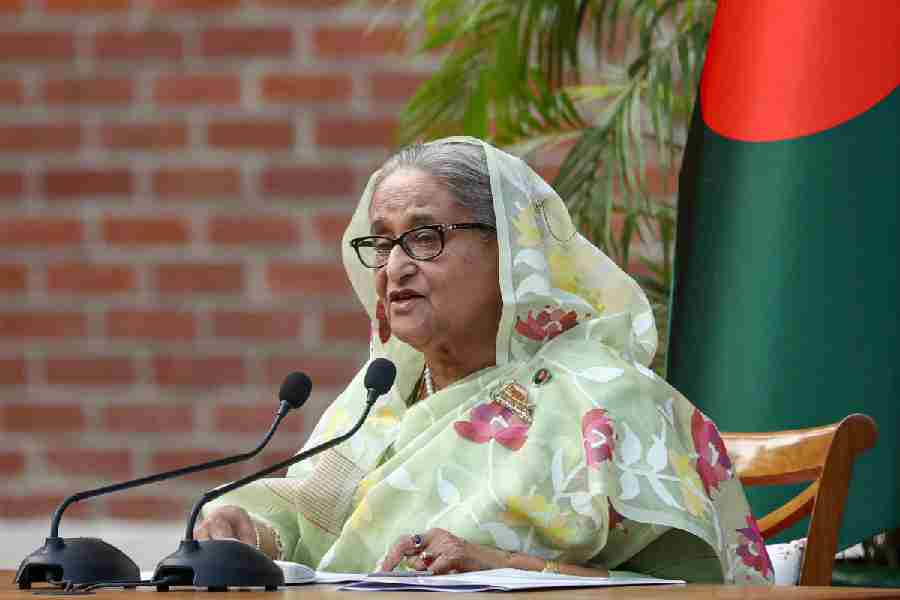The Bangladesh street has erupted yet again in febrile protests demanding the unseating of Sheikh Hasina and the installation of a “national government”.
A massive gathering at the Central Shahid Minar in Dhaka on Saturday and large-scale protests and anti-government violence across the country indicated a full-blown political crisis.
The call for Hasina’s removal came on a day the Prime Minister extended an olive branch to the protesters saying she didn’t want any conflict and that the doors of Ganabhaban, her official residence, were open for talks to break the deadlock.
Her proposal — coming more than a fortnight after student protests seeking quota reforms had turned violent, with around 200 lives lost— failed to impress thestudent agitators, who have the support of a large section of civil society.
“The vast majority of the people, including students, teachers, workers and labourers, feel that an impartial trial and investigation (of the alleged killings of protesters by law enforcers and goons associated with the ruling Awami League) is not possible under this government,” said a 5.30pm statement read out by Nahid, Sarjis and Mamun, the three most prominent faces of the student movement, at the rally.
“Therefore, we announce a one-point demand for the resignation of the current government. At the same time, we demand the formation of an inclusive national government under the leadership of a person acceptable to all.”
The statement urged people to make the nationwide “non-cooperation movement”, beginning on Sunday, a success.
Apparently shaken by the demand from the rally, attended by tens of thousands from across the social spectrum, the Awami League announced mass gatherings all over Bangladesh on Sunday to deal politically with the anti-government rebellion.
To try and douse the flames, Hasina deployed three aides — Awami League presidium member Jahangir Kabir Nanak and party joint general secretaries Mahbubul Alam Hanif and A.F.M. Bahauddin Nasim — to engage with the protesters.
“These measures are too little, too late.... She (Hasina) should have tried these before the protests snowballed into a full-fledged rebellion,” a source in the ruling establishment told this newspaper from Dhaka.
The mood at the gatherings held in various parts of Dhaka — such as Central Shahid Minar, Mirpur, Rampura, Badda and even upscale Gulshan — attended by thousands who braved the rain, suggested Hasina was facing the biggest challenge of her political career, multiple sources said over the phone.
There were reports of similar gatherings in places like Rangpur, Khulna, Jessore and Chittagong, where mobs attacked the homes and offices of some Awami League leaders, including ministers.
“The home of the education minister (Mohibul Hasan Chowdhury) in Chittagong was attacked.... Large parts of the country’s second-most important city have fallen under the control of the protesters,” a source in Dhaka said.
As visuals of the protests and the attacks on Awami League leaders and law-enforcing agencies circulated on social media — along with a list of those who should be in the “national government” — multiple sources in Dhaka said people were talking about a possible regime change.
“People do not realise that the country lacks a progressive political force to replace this government.... But the mood is such that a change is imminent,” a former diplomat said.
He said this perception had gained more traction after text messages began circulating, claiming some officers of the armed forces — deployed in the country since July 19 — had told their superiors at a meeting on Saturday that they would not use force against the protesters.
The Inter Services Public Relations division of the Bangladesh Army said in a media release late on Saturday night that army chief Waqar Uz Zaman had met senior officers and explained that the armed forces were committed to protecting the Constitution, the people of Bangladesh and their properties.
The world reaction to the turmoil in Bangladesh was another talking point. Theories swirled about how India would back Hasina to the hilt or how the US — which has a thorny relationship with Hasina — would aid the protesters.
Although this newspaper has no way of verifying these claims — rumours are known to spread at lightning speed in Bangladesh — this report is mentioning them because of the excitement they have generated across Bangladesh society.
A source close to the government spoke of a possible proclamation of a national emergency by the President, following a possible proposal from the Prime Minister.
“There is a provision that if the President is satisfied that a grave emergency exists in which the security or economic life of Bangladesh, or any part of it, is threatened by war, external aggression or internal disturbance, he may issue a Proclamation of Emergency,” the source said.
He said a temporary arrangement like this would be the second-best alternative for the ruling party.
“But given the mood on the streets, we don’t know whether even the promulgation of an emergency can restore order,” the source added.
Some Awami League insiders shared the results of their introspection with this newspaper.
“There is little doubt that we lost the social media game.... The government was always on the same page with the protesters on their core demand for quota reforms; it also got a favourable order from the (supreme) court that reduced the volume of reservation to just 7 per cent from 56 per cent,” an Awami League source said.
“But it lost the game of perception. All the anti-government forces got together and used social media to mobilise people, and a non-political movement by students became a full-blown political crisis. There is palpable anger against the government on the streets.”
The source regretted his party’s failure to convince the people at large that the student protest had been hijacked by anti-government forces such as the BNP and the Jamaat-e-Islami.
“The entire thing was mishandled,” he said.











